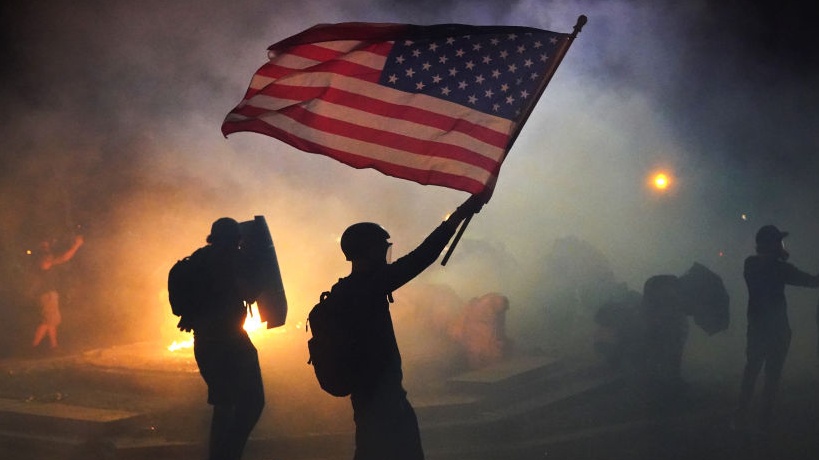Court officials in Portland have asked protesters to sign documents confirming they will stop demonstrating as a condition of release from jail, according to ProPublica.
According to Newsweek, the documents are being signed by Oregon U.S. District Court judges Jolie Russo and John Acosta.
The documents, referred to as "Order Setting Conditions of Release," state the "defendant may not attend any other protests, rallies, assemblies or public gathering in the state of Oregon."
Legal experts told both news outlets that these documents are blatantly unconstitutional and represent a new tactic the government is using in an effort to quell the monthslong protests in Portland. According to ProPublica, police are arresting demonstrators on relatively minor charges and making their release contingent upon them signing these documents.
“Do not participate in any protests, demonstrations, rallies, assemblies while this case is pending,” some documents shared with ProPublica state.
Protesters who spoke to the news outlet said they were given no other options and essentially coerced into signing the document in order to get out of their holding cells.
“Those terms were given to me after being in a holding cell after 14 hours. It was pretty cut-and-dried, just, ‘These are your conditions for [getting out] of here.' If I didn’t take it, I would still be in holding. It wasn’t really an option, in my eyes,” Bailey Dreibelbis told ProPublica.
Dreibelbis was arrested late last month for “failing to obey a lawful order.”
Under the direction of the Trump administration, the government is coming up with ways to make the penalties for protesting increasingly harsh by charging people with federal crimes simply because they were demonstrating on federal property. President Donald Trump has spoken at length about his desire for police and federal officers to do this, particularly with protests that take place near federal buildings.
Multiple lawyers who spoke with ProPublica explained that these protest bans would not hold up in most courts. ACLU lawyer Somil Trivedi called the release conditions "hilariously unconstitutional." Jameel Jaffer, of Columbia University’s Knight First Amendment Institute, explained that the government would have to do a lot to prove it had the right to restrict people from protesting.
“The government has a very heavy burden when it comes to restrictions on protest rights and on assembly. It’s much easier for the government to meet that burden where it has individualized information about a threat. So for example, they know that a particular person is planning to carry out some unlawful activity at a particular protest,” Jaffer said.
“I don’t see that as constitutionally defensible. And I find it difficult to believe that any judge would uphold it,” he added.
Geoffrey Stone, a University of Chicago Law School professor, said plainly that “even if they’re right that these people did, in fact, step beyond the bounds of the First Amendment and do something illegal, that doesn’t mean you can then restrict their First Amendment right.”
None of the judges or federal attorneys involved in creating the documents responded to requests for comment from ProPublica or Newsweek.
While protests against police brutality have continued across the country, the demonstrations in Portland have taken national prominence because of Trump's focus on the city and his decision to send federal police there, as Blavity previously reported.
In recent weeks Trump has threatened to send federal agents to other cities that have had large protests as well.

